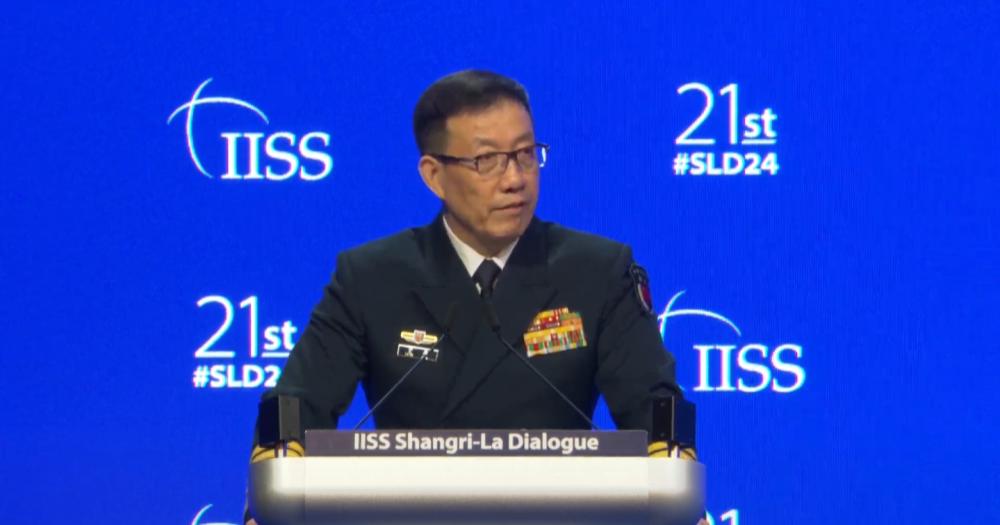China's Minister of National Defense Dong Jun spoke on Jun. 2 at the 2024 Shangri-La Dialogue (SLD) about regional security and cooperation, as well as China's approach regarding Taiwan and the South China Sea.
Imperial aggression
Dong opened with his view of the history of the Asia Pacific, stating that most countries in the Asia Pacific had suffered from imperial aggression or oppression, and had a shared memory of devastating wars and turbulence.
Dong said that the countries of the Asia Pacific, despite problems and differences from time to time, always preferred dialogue and consultation to resolve differences.
He said that China is part of a group of developing nations that had suffered greatly under imperial colonialism.
Because of that suffering, Dong said that China understands the value of treating other countries and their militaries equally and with mutual respect.
Dong warned against attempts to turn countries in the region into "vassal states" or draw them into bloc confrontations, saying that “we hope to live in an equal and orderly multipolar world”.
SEA nuclear-weapons free
Dong also said that China values the peace and security that the Asia Pacific region had enjoyed, and voiced China's backing for a United Nations (UN)-centric international order, with more authority being vested in the UN.
Dong emphasised the contributions that China had made to UN peacekeeping efforts, and committed China to furthering that contribution.
Dong also said that China had anchored its strategic culture on "universal love and non-aggression", citing its commitment to a “no first use of nuclear weapons” policy as an example, and advocating for a Southeast Asia nuclear weapons-free zone.
Dong further claimed that China had never provided military aid nor dual-use items to either side in the Russian invasion of Ukraine.
This contradicts accusations made by some in the United States (U.S.) that China had been doing exactly that, along with North Korea.
Dong also advocated for an immediate ceasefire in the Israel-Hamas War.
On the Korean Peninsula, Afghanistan, and Myanmar, Dong said China had actively sought political settlement, playing a "constructive role" on international security issues.
Taking orders
Dong railed against those who would attempt to “bolster themselves by taking orders from hegemonic powers”, possibly an allusion to the ongoing dispute between the Philippines and China in the South China sea.
China has heavily hinted at the theory that the Philippines is being instigated by the United States to seek confrontation with China over disputed claims in the South China sea.
This was alluded to by a Chinese general asking a question of Philippines president Ferdinand Marcos Jr. On May 31.
Marcos Jr denied that the Philippines actions had violated the Asean charter.
Dong said that China valued the international framework set out by the United Nations Convention on the Law of the Sea (UNCLOS), and said that the authority of international law was based on principles of respecting facts and upholding justice.
In another allusion to the South China Sea, Dong said that some parties were "fabricating historic facts, spreading false narratives", and attempting to enforce what he termed the “illegal arbitration award”.
This was likely a reference to the case heard by the Permanent Court of Arbitration in the Hague that ruled in favour of the Philippines against China regarding claims in the South China Sea.
Taiwan and the pillar of shame
Dong also warned against foreign interference in Taiwan, saying that Taiwan was a core national interest for China.
China considered its core national interests as sacred and inviolable, and that safeguarding China's sovereignty and territorial integrity was the “sacred mission” of the Chinese military.
Calling China's One China Principle a “universally recognised norm” governing international relations, Dong accused the members of the Democratic Progressive Party in Taiwan of pursuing separation in an incremental way.
Dong said that they were “bent on erasing the Chinese identity of Taiwan and severing social, historical, and cultural links across the Taiwan Strait”.
Accusing the DPP of making "fanatical statements", he said this showed the “betrayal of the Chinese nation and their ancestors”.
“You will be nailed to the pillar of shame in history.“
Dong may have been referring to the inauguration speech of newly-elected Taiwan President William Lai, made on May 20, 2024.
Lai said that his government would neither "yield nor provoke" and maintain the status quo in cross-Strait relations.
However, Lai also said "The Republic of China and the People’s Republic of China are not subordinate to each other, and "all our political parties ought to oppose annexation and protect sovereignty."
"Malicious intentions dragging Taiwan into a dangerous situation": Dong
Dong also accused "external interfering forces" of "hollowing out" China's One China Principle with "salami-slicing" tactics and arming Taiwan militarily.
He accused such forces of emboldening Taiwan separatists in an attempt to contain China with Taiwan.
"These malicious intentions are dragging Taiwan into a dangerous situation," Dong said.
He said China is committed to "peaceful reunification" with Taiwan, but that prospect is increasingly being eroded by Taiwanese separatists and foreign forces.
The Chinese People's Liberation Army would remain a strong force for upholding national unification, Dong said, and China would take resolute actions to curb Taiwanese independence, to make sure such a plot never succeeded.
"Anyone who dares to separate Taiwan from China will only end up in self-destruction," he said.
Related story
Top image via The International Institute for Strategic Studies/YouTube

If you like what you read, follow us on Facebook, Instagram, Twitter and Telegram to get the latest updates.



